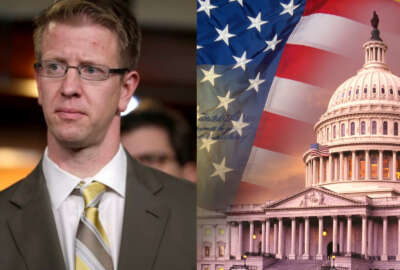Boarman to step down as GPO chief
Senate leaves town without confirming nomination of 26th public printer. Boarman is unclear why his nomination has stalled.
wfedstaff | June 4, 2015 3:12 pm
By Michael O’Connell
@moconnellWFED
Web Editor
Federal News Radio
As the Senate adjourned for the holiday break Saturday following approval of the 2012 budget bill, one piece of business was left unresolved — the confirmation of Bill Boarman as head of the Government Printing Office.
Boarman, who is the 26th public printer to lead the GPO, was installed in his current job by President Barack Obama as a recess appointment. A Senate confirmation was all that he needed in order to keep his job.
Earlier in the year, according to Roll Call, Sens. John Isakson (R-Ga.) and Orrin Hatch (R-Utah) blocked Boarman’s nomination. At issue was the nomination of a member of the GOP to the National Labor Relations Board. The two senators eventually dropped their objection, but Senate Majority Leader Harry Reid (D-Nev.) said Saturday that new problems had come up concerning the nomination and that the Senate would not be able to confirm Boarman before the end of 2011. The chamber would not reconvene until the middle of next month.
“I don’t think it has anything to do with me,” Boarman told The Federal Drive with Tom Temin and Amy Morris on Monday. “My record has been one of accomplishment and achievement, and I’ve been praised by both Republicans and Democrats for the work that I’ve done.”
Boarman sees his confirmation as falling victim to the process of the Senate, in which someone uses the blocking mechanism to clog things up. “I think in the last minute there were some disagreements about the Senate and where it was going to move after it adjourns and I think I just got caught by that whipsaw,” he said. “Nonetheless, it’s a tragic effect for me and the GPO.”
Not an easy thing
As a recess appointment, Boarman served as the head of the GPO, while waiting for the Senate to make the appointment official. He admitted that this quasi-limbo status was not an easy thing to deal with at times.
“The good thing was that I had a wonderful place to go every day, with a great workforce who deeply appreciated the efforts I made to turn the agency around,” he said. “So, I focused on that for the year and just hoped that by working hard and doing the things that Congress asked me to do — reduce the size of government, reduce costs and create a better, automated atmosphere at GPO, all of which I accomplished in that less than 12 month period — that the other thing would just take care of itself.”
Now that the year has passed and the confirmation failed to emerge, Boarman looks back with a degree of disappointment and discouragement.
“I was asked by the White House to do this job, so I left my previous employer and came on with the full understanding that I would serve at the pleasure of the President,” he said. “That was cut a little short.”
Even so, Boarman said that life will go on for him. He’s more concerned about what his departure will mean to the agency and employees he leaves behind.
“I’ll be there for a few more weeks, and I’ve offered to stick around as a volunteer after that in the transition, because we’ll have appointed folks running the agency after my term ends,” he said.
A person can only be recess appointed once, so Boarman doesn’t think there’s much that can be done at this point, although he will be speaking to the White House today to see if there is something else they would like him to do. “I think my options are very limited,” he said.
Boarman is willing to stick around for a few months to help with the transition, and then he expects to weigh his options. “Maybe there’s something else I can do for a another organization or for the president,” he said.
GPO improvements
In a statement released Sunday, the GPO credited Boarman with a number of successes at the agency, including conducting a buyout that reduced 330 positions and creating a taskforce that collected more than $12.5 million in overdue payments from customer agencies.
Under Boarman’s watch, the GPO resolved a number of financial issues that he described as potentially crippling matters for the agency.
“We’ve been able to cut back on some unnecessary expenditures,” he said. “In fact, we just ended the year with a $5.6 million surplus. At the beginning of the year, the CFO told me that if we continued to burn cash at the rate that it was burning when I arrived that we would be broke by 2012.”
Boarman reduced on unnecessary overtime and cut the size and structure of the workforce. “We implemented all of that and it looks like in addition to the $5.6 million in savings we’re going to have about $30 million next year because of the cutbacks that we’ve made,” he said.
Congress has expressed a desire to “go paperless” and the GPO has offered guidance on how that can be accomplished, include releasing its first mobile app, a Mobile Member Guide for the 112th Congress.
“Our next step is to make that an even larger app and add bios to that,” Boarman said. “And then from there, the sky’s the limit. We could see us actually having the Congressional Record as an app. … All of that will help Congress move to a paperless society.”
RELATED STORIES
Multimedia: Inside GPO’s printing plant
GPO evolves from printing press to digital platform
Special series: 150 years at GPO
Copyright © 2024 Federal News Network. All rights reserved. This website is not intended for users located within the European Economic Area.





